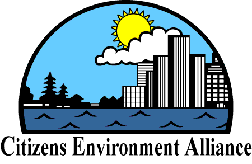

| March 18, 2003 |
| FOR IMMEDIATE RELEASE |
Windsor, Ontario - The environmental impacts of on-road freight traffic have been in the background of the ongoing debate about border infrastructure development. Actions to reduce on-road freight traffic, in order to improve ecosystem and human health in southwestern Ontario, are urgently required.
There is a large volume of unnecessary on-road freight traffic traveling through southwestern Ontario and crossing the international border at Windsor and Sarnia. For example, according to Canada Customs and Revenue Agency, between Aprils 2000-2001 approximately 180,000 transport trucks designated as "in transit" crossed border points in Windsor and Sarnia. These vehicles were sealed at the international border and allowed to cut across Ontario while transporting goods between sites in the United States.
"This is another example of unnecessary use of Ontario's roads by transport trucks. We get the smog and other environmental impacts while some corporations outside of this region profit," said Derek Coronado, Research and Policy Coordinator of the Citizens Environment Alliance (CEA). "Building more roads and highways is not a solution to our environmental problems. We need more efficient and environmentally sound methods of transportation rather than more trucks passing through our communities," added Coronado.
Another example of unsustainable freight transportation is international waste hauling. Currently, there are approximately 400 border crossings per day at Sarnia and Windsor by trucks shipping Ontario municipal waste into Michigan. Additional transport trucks haul commercial, industrial and hazardous waste through border crossings in Sarnia and Windsor. The CEA has joined with other environmental and community organizations throughout the border region to halt waste shipments in an effort to improve environmental quality.
For more information contact:
Derek Coronado
Research and Policy Coordinator,
Citizens Environment Alliance
(519) 973-1116